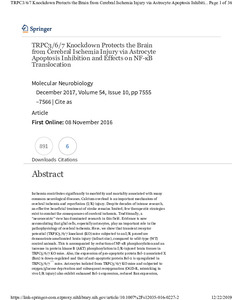Please use this identifier to cite or link to this item:
https://repositorio.uca.edu.ar/handle/123456789/9460| Título: | TRPC3/6/7 knockdown protects the brain from cerebral ischemia injury via astrocyte apoptosis inhibition and effects on NF-кB translocation | Autor: | Chen, Xiaoyun Lu, Min He, Xiju Ma, Le Birnbaumer, Lutz Liao, Yanhong |
Palabras clave: | ENFERMEDADES CEREBROVASCULARES; ISQUEMIA ENCEFALICA; ACCIDENTE CEREBROVASCULAR; TRATAMIENTO MEDICO; PREVENCION Y CONTROL; APOPTOSIS | Fecha de publicación: | 2017 | Editorial: | Springer | Cita: | Chen, X., Lu, M., He, X. et al. TRPC3/6/7 knockdown protects the brain from cerebral ischemia injury via astrocyte apoptosis inhibition and effects on NF-кB translocation [en línea]. Molecular Neurobiology. 2017, 57. doi:10.1007/s12035-016-0227-2. Disponible en: https://repositorio.uca.edu.ar/handle/123456789/9460 | Resumen: | Abstract: Ischemia contributes significantly to morbidity and mortality associated with many common neurological diseases. Calcium overload is an important mechanism of cerebral ischemia and reperfusion (I/R) injury. Despite decades of intense research, an effective beneficial treatment of stroke remains limited; few therapeutic strategies exist to combat the consequences of cerebral ischemia. Traditionally, a “neurocentric” view has dominated research in this field. Evidence is now accumulating that glial cells, especially astrocytes, play an important role in the pathophysiology of cerebral ischemia. Here, we show that transient receptor potential (TRP)C3/6/7 knockout (KO) mice subjected to an I/R procedure demonstrate ameliorated brain injury (infract size), compared to wild-type (WT) control animals. This is accompanied by reduction of NF-кB phosphorylation and an increase in protein kinase B (AKT) phosphorylation in I/R-injured brain tissues in TRPC3/6/7 KO mice. Also, the expression of pro-apoptotic protein Bcl-2 associated X (Bax) is down-regulated and that of anti-apoptotic protein Bcl-2 is upregulated in TRPC3/6/7 mice. Astrocytes isolated from TRPC3/6/7 KO mice and subjected to oxygen/glucose deprivation and subsequent reoxygenation (OGD-R, mimicking in vivo I/R injury) also exhibit enhanced Bcl-2 expression, reduced Bax expression, enhanced AKT phosphorylation, and reduced NF-кB phosphorylation. Furthermore, apoptotic rates of TRPC3/6/7 KO astrocytes cultured in OGD-R conditions were reduced significantly compared to WT control. These findings suggest TRPC3/6/7 channels play a detrimental role in brain I/R injury. Deletion of these channels can interfere with the activation of NF-кB (pro-apoptotic), promote activation of AKT (anti-apoptotic), and ultimately, ameliorate brain damage via inhibition of astrocyte apoptosis after cerebral ischemia/reperfusion injury. | URI: | https://repositorio.uca.edu.ar/handle/123456789/9460 | ISSN: | 0893-7648 (impreso) 1559-1182 (on line) |
Disciplina: | MEDICINA | DOI: | 10.1007/s12035-016-0227-2 | Derechos: | Acceso Abierto | Fuente: | Molecular Neurobiology. 2017, 57 |
| Appears in Collections: | Artículos |
Files in This Item:
| File | Description | Size | Format | |
|---|---|---|---|---|
| trpc-3-6-7-knockdown.pdf | 578,37 kB | Adobe PDF |  View/Open |
Page view(s)
110
checked on Apr 30, 2024
Download(s)
392
checked on Apr 30, 2024
Google ScholarTM
Check
Altmetric
Altmetric
This item is licensed under a Creative Commons License

